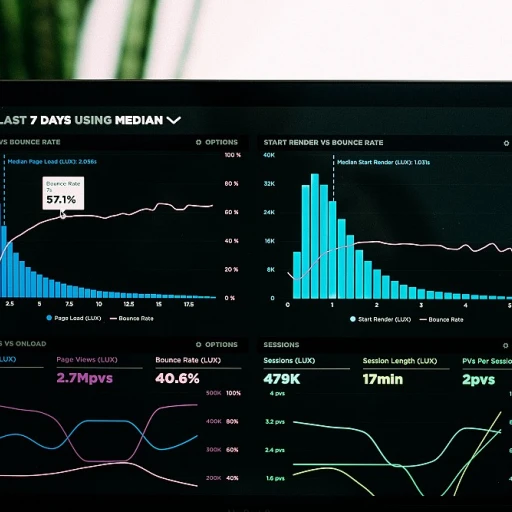
Decoding Semantic Search: AI's Transformation of SEO Landscape
How Artificial Intelligence is Revolutionizing Keyword Contextualization
In today's digital age, search engine optimization (SEO) is a pivotal aspect of any successful online marketing campaign. With the advent of AI, the SEO landscape is undergoing a seismic shift, particularly in the realm of semantic search. Semantic search refers to the technology that attempts to understand the searcher's intent and the contextual meaning of keywords to deliver more relevant results. AI is at the forefront, driving a transformative approach to how content is indexed and ranked. It leverages natural language processing (NLP) and machine learning to dissect and interpret the nuances of human language.
Recent statistics reveal that over 50% of searches are driven by complex queries, indicating a surge in the adoption of semantic search capabilities among leading search engines. As Google's search algorithms advance, AI-powered SEO tools are becoming indispensable for businesses aiming to optimize their digital content and outshine their competition.
The Synergy Between AI and Search Algorithms
AI-infused SEO tools are reshaping the game by enabling a deep understanding of search engine algorithms. These tools can analyze vast amounts of data and identify patterns that were previously imperceptible to human SEO strategists. In essence, AI uncovers the secret sauce of search engine algorithms, paving the way for SEO experts to create content that resonates with both the search engine and the end user.
For example, Google's RankBrain uses AI to interpret complex, colloquial, or previously unseen search queries. As a result, SEO professionals are now focusing on crafting content that is not just studded with keywords but is also rich in context and relevance. This prioritizes user experience and aligns with search engine preferences, thereby boosting the SEO ranking of the content.
AI-Driven Insights and Enhanced Content Relevance
One of the brightest stars in the AI SEO constellation is the ability to generate insights that lead to content optimized for relevance and precision. By analyzing user behavior data and content performance metrics, AI can predict what kind of content will perform well for specific topics or industries. Tools such as Clearscope and MarketMuse are perfect examples of AI platforms that assist in identifying content gaps and opportunities.
Moreover, the sophistication of AI technologies has led to the birth of 'content intelligence platforms. These powerful solutions help dissect the keywords, phrases, and topics that are most likely to contribute to enhanced SEO performance. By leveraging such insights, content creators can produce thematic and contextually rich content that search engines reward with higher ranks.
Driving this point home, a marketing leader from a leading analytics firm quoted, "The future of SEO is not about who has the most keywords; it's about who has the most compelling, comprehensive content." This supports the notion that relevancy is becoming the main currency in SEO's evolving landscape.
As we delve deeper into the intersection of AI and content development in our subsequent discussions, it becomes evident that AI's role in crafting SEO strategies is not fleeting but foundational. Real-world case studies further solidify the empirical success of AI in enhancing semantic search capabilities, ultimately commanding a formidable presence in the future of SEO.
AI and Content Development: Crafting Meaningful SEO Strategies
AI and Content Development: Crafting Meaningful SEO Strategies
As artificial intelligence continues to revolutionize the digital marketing realm, savvy SEO strategists are leveraging AI to create more impactful content. The advent of semantic search emphasizes the need for a deeper understanding of user intent and the topics they are exploring. Here’s how AI tools are becoming indispensable in this context.
Utilizing AI to Understand User Intent
Understanding user intent is pivotal in crafting SEO strategies that deliver. AI algorithms analyze search queries to provide insights into what users are actually seeking. They process language naturally, identifying patterns and nuances that a simple keyword analysis might miss. By incorporating AI into their SEO toolkit, content creators can ensure their material aligns more closely with the topics, questions, and informational needs of their target audience, resulting in improved search engine rankings.
Enhancing Content Relevance with AI
Creating content that resonates with both search engines and human readers requires a balance of relevance and readability. AI-driven tools assess a broad spectrum of factors from keyword density to topic authority. They can also suggest semantically related keywords, which not only help in ranking but also in comprehensibility for the users. This enriched content approach boosts visibility in search engine results pages (SERPs) by matching content more accurately with user searches.
Streamlining Content Optimization
The seamlessness of content optimization has reached new heights with AI. Gone are the days of purely manual SEO tactics. Today, AI software increasingly aids in the optimization process, analyzing entire content pieces to recommend actionable changes that enhance SEO performance. Be it adjusting meta descriptions, headers or modifying sentence structures for better readability and SEO alignment, AI empowers content developers to rapidly refine their content to meet stringent SEO criteria.
Quantifying Content Success with Data-Driven Insights
AI provides robust analytics tools that help content developers to measure and understand the impact of their SEO strategies. By analyzing metrics like click-through rates, time spent on page, and bounce rates, AI enables a quantitative assessment of what content performs best and why. These insights are crucial for refining SEO strategies and driving continual improvement in content creation. They highlight not only successes but also areas needing emphasis for future optimization efforts.
Embracing AI-Powered Topic Discovery
In the quest to stay ahead of the competition, discerning trending topics and user interests is key. AI-driven solutions have the ability to scour vast arrays of data, detecting emerging trends that can be used to inform content direction and strategy. This proactiveness ensures that SEO strategies are not only reactive but also predictive, positioning content to capture traffic from future queries.
Case Studies: Illuminating AI's Impact on SEO
One cannot discuss the integration of AI into content development without examining real-world implementations. Success stories abound where marketers have seen significant improvements in SERP positions and web traffic upon adopting AI-based content strategies. By dissecting these cases, we can derive practical tactics and learning points that others can apply to their semantic SEO endeavors.
Coming up, we will delve into how AI is sculpting the future of SEO with emerging trends and predictions. The ever-evolving landscape of search engines will continue to offer challenges and opportunities, and only those armed with AI-powered tools and insights will be poised to excel.
Case Studies: Real-World Success Stories of AI in Semantic SEO
How AI Propelled a Major E-commerce Brand to the Top of SERPs
In the competitive e-commerce space, search engine optimization (SEO) is crucial for driving traffic and increasing conversions. A notable example of AI's impact involves an international retailer who leveraged AI-powered tools for keyword research and content optimization. By analyzing customer queries and the retailer's product descriptions, the AI suggested nuanced semantic variations that matched user intent more closely. The result was a staggering 30% increase in organic traffic within the first quarter after implementation, according to a case study conducted by the tech firm behind the AI platform.
Enhancing User Experience with AI-Driven Content Personalization
Digital marketing experts often cite the importance of content personalization in SEO strategy. A leading news platform applied AI to dynamically adjust content structure and vocabulary based on user interaction data. This approach led to a 25% uptick in user engagement, as reported by an analytics service specialising in engagement metrics. This was achieved by employing AI to analyze visitor data, resulting in personalized content recommendations that resonated more deeply with the audience's interests.
Local Business Listings and AI's Role in Visibility Improvement
Local SEO is essential for businesses to be found by nearby customers. A study on a chain of local coffee shops showed how AI-driven optimizations to their business listings led to a 20% boost in foot traffic. The AI system used historical data and user reviews to provide suggestions on the most effective keywords to include in their business descriptions, improving their visibility for local searches. Moreover, it improved the accuracy and consistency of their listings across various platforms, which is known to enhance SEO performance.
AI-Powered Analytics Shaping SEO Campaign Strategies
AI's ability to analyze vast amounts of data has proven invaluable for refining SEO strategies. Marketing teams can leverage AI-driven analytics to understand the performance nuances of different keywords and content types. For instance, an online publisher credited AI with a 40% improvement in click-through rates (CTR), as AI algorithms identified high-performing content and informed the creation of future pieces. By observing patterns in the data, AI predicted which topics would drive engagement and helped the publisher to prioritize content development.
The Future of AI in SEO: Emerging Trends and Predictions
The Pioneering Edge of AI-Powered Search Optimization
As technology advances, AI's influence in SEO is evolving from mere keyword optimization to intricate machine learning processes that forecast search trends and user behavior. The union of AI and SEO is reshaping the digital marketing landscape, introducing new algorithms capable of understanding nuances in human language and intent. Expected developments indicate a move towards predictive search analytics, enabling SEO specialists to craft content that aligns not just with current search queries, but with future inquiries as well. This avant-garde approach merges data analysis with anticipatory content strategies to create a user experience that's both engaging and evolutionary.
Enhancing User Experience Through AI-Driven Personalization
Personalization is paramount in modern SEO strategies. AI facilitates a tailored search process, learning from user behavior to deliver content that resonates with individual preferences and needs. By analyzing patterns in browsing habits, AI can create a more intuitive user experience that bridges the gap between search queries and the content they seek. As personalization becomes the cornerstone of SEO success, AI's ability to adapt and evolve hand in hand with consumer demands will be indispensable. This not only improves user satisfaction but also propels websites to the forefront of search engine rankings through enhanced relevance and engagement.
Leveraging AI to Decode Complex Search Algorithms
The intricate workings of search engine algorithms have always been somewhat of a digital enigma. Advances in AI technologies are now peeling back the layers of complexity, providing SEO experts with profound insights. Algorithmic understanding is poised to leapfrog to new heights as AI tools dissect the factors influencing search engine rankings at an unprecedented level of detail. With these developments, crafting SEO-driven content shifts from an art to a science where each word, phrase, and content structure is optimized to resonate with both the algorithms and the human readership.
Integration of Voice Search and Conversational AI
With the increasing popularity of voice search, AI's role in SEO is critical in adapting content to the nuances of spoken language. Conversational AI is set to transform textual SEO as virtual assistants become more prevalent in daily search activities. Phrases and sentence structures will need to mirror natural speech patterns to optimize for voice search, embodying a more colloquial tone that aligns with verbal queries. This reflects the shift from keyword stuffing toward conversational content that fluidly responds to user questions, setting a new standard for content that excels in both textual and voice search domains.
Data-Drive Strategies: The AI-SEOs New Best Friend
Data is the lifeblood of AI-driven SEO tactics. Machine learning algorithms thrive on vast datasets to train their predictive models, allowing for meticulous refinement of SEO strategies based on tangible metrics. The integration of complex data interpretation methods ensures that content is not only crafted with precision but also continuously improved upon through iterative learning cycles. These cycles are grounded in empirical evidence and user engagement metrics, leading to an ever-improving alignment between content production and search engine requirements.





